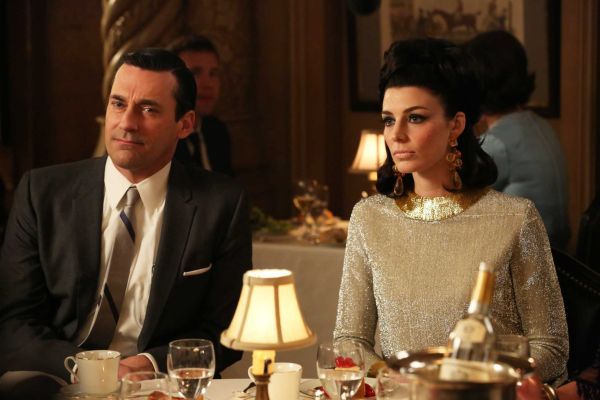The sixth, and possibly next-to-last, season, of “Mad Men” ends with an episode titled “In Care Of,” for which the AMC site offers this description, reproduced here in full: “Don (Jon Hamm) has a problem.”
Speculation has seeped into the information void — doubtless all of it wrong — ranging from the death of Don’s wife, Megan (Jessica Pare), to the breakup of newly formed ad agency Sterling Draper & Partners. Last week’s episode (“The Quality of Mercy”) ended with Don in his office, helpless and in a fetal position, after rejections by both his daughter, Sally (Kiernan Shipka), and Peggy Olson (Elisabeth Moss), who declared him “a monster.” Don has a problem, indeed.
Meanwhile, just to recap the season: To land a major account — Chevy — Sterling Draper decides to merge with Cutler Gleason and Chaough, which ends up creating conflicts, both business and personal. Megan, now deep in her career as a soap actress, finds herself further estranged from Don, who throws himself into an obsessive affair with neighbor Sylvia (Linda Cardellini). The season shocker: Sally witnessed them in flagrante delicto.
Not one of us “Mad Men” obsessives, all 2 million or so, seems able to agree on anything related to the sixth season, up to and including whether the mysterious Bob Benson (James Wolk) is, was or ever will be gay. Great season or boring one? Artistic triumph or artistic dud? A deep philosophic journey into the heart of Don’s blighted soul? Or Don just being Don — a functioning alcoholic with the moral fiber of an amoeba? Go ahead.
Ask someone (if you haven’t already). You’re in for an argument.
Or better still, read someone. No “Mad Men” season to date, maybe not even any show since “Lost,” has engendered quite the literary output as this one. Thousands — maybe hundreds of thousands — of blogs, articles and tweets have analyzed every scene, allusion, metaphor or parallel. Observers have had a field day with the meta-meaning of the sixth season, although some may now reluctantly concede that they just spent a lot of time chasing a rabbit down a hole.
This fevered output may have had more to do with the year the sixth was set in — 1968 — than with creator Matthew Weiner’s taste for full-blown literary invention. That terrible year, that crucible year when the Rev. Martin Luther King Jr. and Robert Kennedy were assassinated, and thousands of young Americans perished in Vietnam, bled through the screen this season. Death stalked these characters more than usual, Don, especially. The season began with a scream (literally) and may well end with one.
Fans were jittery. We needed to know where all this was going, if anywhere, and what it meant, if anything. Surely there was meaning in that dreamlike moment when Don, in a drug-induced stupor, “sees” Megan at the hippie Hollywood Hills party, dressed in the same shirt Sharon Tate wore when she was murdered (and she was also pregnant!). Or what about that opening episode, “The Doorway,” when Don absent-mindedly lifted the Zippo lighter of a GI on his way to the war? (Don accidentally incinerated his namesake with a Zippo in Korea — remember?)
In fact, this season’s relentlessly dark foreshadowing and relentless literary gamesmanship very nearly obscured just how entertaining it often was. The sixth may have been the most disturbing “Mad Men” season to date, but also the funniest — not an inconsequential feat.
How will this remarkable season end Sunday?
Really, we’ll all find out soon enough. As “Mad Men” has pretty well established over its glorious run, it’s not about the end of the journey but the journey itself, and this leg of the trip has often been a joyride.
Send questions/comments to the editors.



Success. Please wait for the page to reload. If the page does not reload within 5 seconds, please refresh the page.
Enter your email and password to access comments.
Hi, to comment on stories you must . This profile is in addition to your subscription and website login.
Already have a commenting profile? .
Invalid username/password.
Please check your email to confirm and complete your registration.
Only subscribers are eligible to post comments. Please subscribe or login first for digital access. Here’s why.
Use the form below to reset your password. When you've submitted your account email, we will send an email with a reset code.